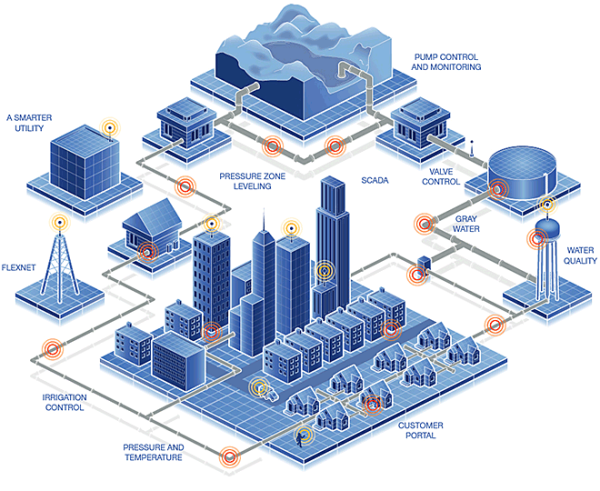ABOUT AMR, AMI & METERING
Automatic Meter Reading (AMR) is a system
and process used to remotely collect water meter data without the physical
presence of personnel at the reading point. The system can be configured to
read multiple meters at exactly the same point in time such as midnight or at
the end of every month. Automatic Meter Readers (AMR) also known as SMART
Meters afford suppliers with a cost effective solution to meter reading.
Automatic meter readers use a real time wireless communication network to
connect digital water meters with a central management system. Digital water
meters use ultrasonic measurement technology to provide precise meter readings.
AMR is a key driver of efficiency for water utilities by lowering costs by
optimizing maintenance interventions and lowering reading operations. An
effective AMR system can only work if the water meter has a pulse out where a
radio transmitter will be attached to it. Multiple meter readings will then be transmitted
to a device called the repeater. Using GPRS the readings will be transmitted to
a server. The data can then be obtained from the server for use. AMR devices incorporate smart image
recognition technology (OCR – Optical Character Recognition), BPL (Broadband
Power line) as well as PLC (Power line Communications) technologies.
Advanced Metering Infrastructure (AMI) are the systems beyond simply the meters that allow utility professionals to not only collect and analyze water usage, but also communicate back to metering devices, either on request or on a schedule. These systems include electronic/digital hardware and software providing continuously available remote communications. A typical AMI solution equips the customer with advanced solid state, electronic AMR meters that collect time-based data. These meters have the ability to transmit the collected data through commonly available fixed networks such as Broadband over Power Line (BPL), Power Line Communications (PLC), Fixed Radio Frequency (RF) networks, and public networks (e.g., landline, cellular, paging). The meter data are received by the AMI host system and sent to the Meter Data Management System (MDMS) that manages data storage and analysis to provide the information in useful form to the utility.
AMR
Automatic Meter Reading
AMR is a technology that periodically (daily, hourly…) communicates
with smart meters, collects consumption and meter state information with
one way data communication and then transfers the data to control center
for storage, billing, analisys and investment planning purposes.
Electronics, digital hardware and software work simultaneously and
provide continues periodical meter reading with all time
available remote communication.Provides detailed information collection
ability.
Automatic Meter Reading
AMR is a technology that periodically (daily, hourly…) communicates
with smart meters, collects consumption and meter state information with
one way data communication and then transfers the data to control center
for storage, billing, analisys and investment planning purposes.
Electronics, digital hardware and software work simultaneously and
provide continues periodical meter reading with all time
available remote communication.Provides detailed information collection
ability.
Advanced Metering Infrastructure
AMR goes beyond AMR system and provides remote control usage
for fixed meter networks with two way data communication.
Meters in the AMI system are smart meters which can use collected
data with programmed logic.





评论
发表评论